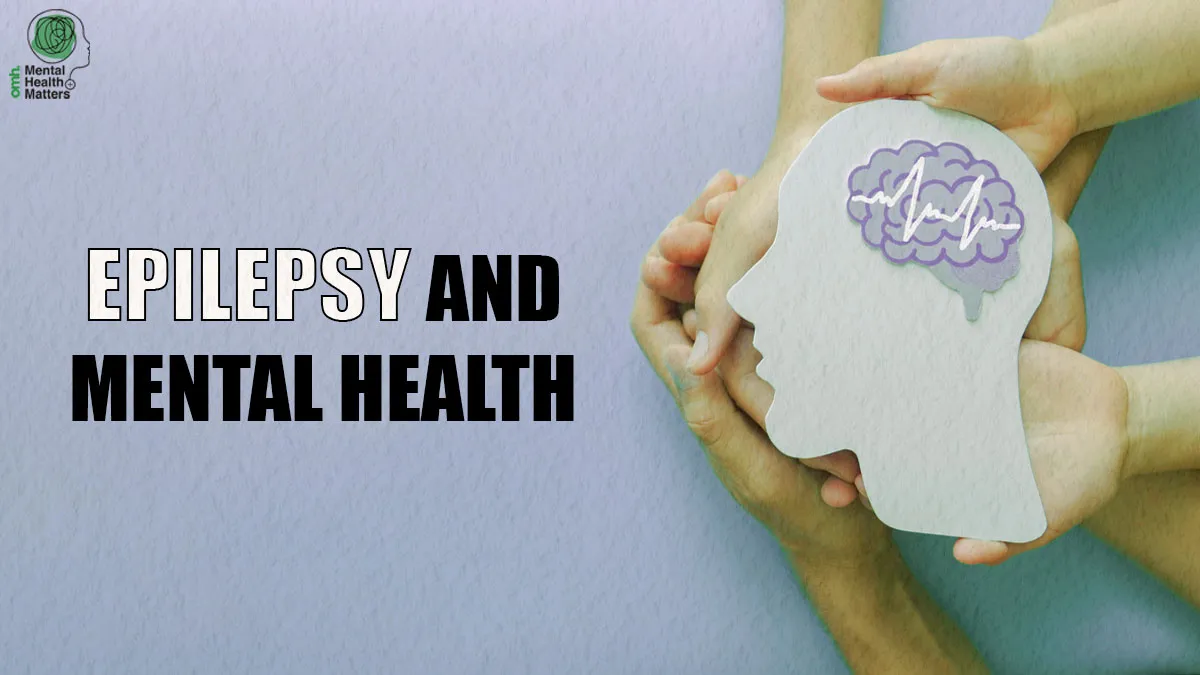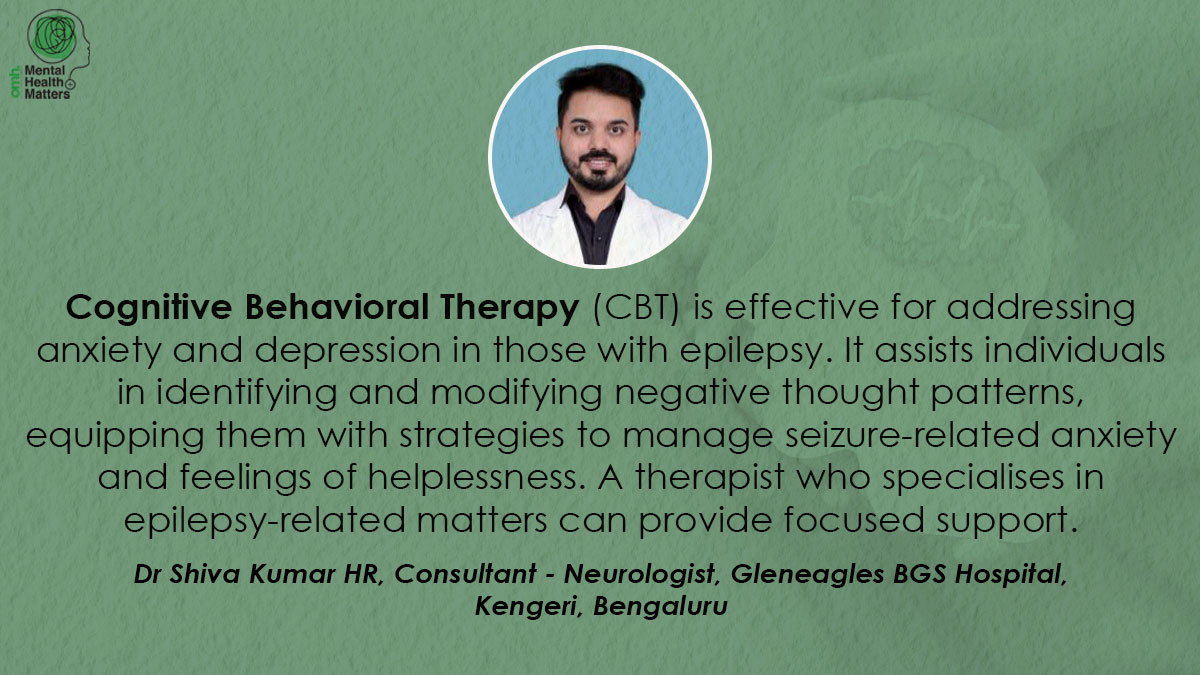
Epilepsy is often recognised for its physical symptoms, particularly recurrent seizures, but the mental health effects it can have on those living with the condition are just as significant. As we observe National Epilepsy Day, it's important to shed light on how epilepsy intertwines with mental well-being, especially when it comes to anxiety, depression, and emotional distress. While much focus is given to controlling seizures, the emotional challenges individuals with epilepsy face deserve equal attention.
Table of Content:-
CHECK YOUR
MENTAL HEALTH

As a part of our "Mental Health Matters" campaign, we reached out to Dr Shiva Kumar HR, Consultant - Neurologist, Gleneagles BGS Hospital, Kengeri, Bengaluru, who explained how epilepsy influences mental health and ways to manage these challenges.
Epilepsy and Its Prevalence

According to the National Institute of Neurological Disorders and Stroke, epilepsy is a long-term brain condition where clusters of nerve cells, or neurons, in the brain occasionally send incorrect signals, leading to seizures. Typically, neurons transmit electrical and chemical signals that communicate with other neurons, organs, and muscles to control thoughts, emotions, and actions.
As per the World Health Organization (WHO), approximately 50 million people across the globe are affected by epilepsy, making it one of the most prevalent neurological conditions. With accurate diagnosis and treatment, it's estimated that up to 70% of individuals with epilepsy could live without seizures.
Also Read: Familial Epilepsy: Expert Explains The Genetic And Environmental Factors Behind Inherited Seizures
Mental Health Challenges in Epilepsy
“People living with epilepsy often face coexisting mental health issues like anxiety and depression. Also, they are twice as likely to experience these conditions as the general population,” said Dr Kumar.
Several factors contribute to this increased risk, including the unpredictability of seizures, which creates a constant sense of unease, and social stigmas that may lead to isolation.
Anxiety

One of the most common mental health issues linked to epilepsy is anxiety, particularly what’s known as 'seizure anxiety.' This is the fear of having a seizure in public or during everyday activities, such as socialising, travelling, or even working. This uncertainty can make it difficult for people with epilepsy to feel secure in their daily lives, which, in turn, can worsen their anxiety.
Depression

Depression is another common issue that people with epilepsy face. The emotional toll of living with a condition that interrupts personal goals and aspirations can lead to feelings of isolation, frustration, and helplessness. For some, depression may also result from the stigma associated with epilepsy, as many people may feel alienated or misunderstood by society.
According to a 2023 study, stigma significantly contributes to the social isolation of individuals with epilepsy, making it harder for them to manage and adapt to the condition. This isolation also increases the risk of developing psychiatric comorbidities like anxiety and depression, further negatively affecting their overall quality of life.
Furthermore, certain Antiepileptic Drugs (AEDs) prescribed to control seizures can have side effects that contribute to mood changes, exacerbating symptoms of depression.
A systematic study of individuals with drug-resistant focal epilepsy found that 43% experienced postictal depression, 45% had postictal anxiety, and 7% exhibited psychotic symptoms. These symptoms occurred in over half of their seizures and typically lasted for a median of 24 hours.
Also Read: Epilepsy: Expert Explains Treatment Options And Lifestyle Changes
Strategies for Managing Anxiety and Depression
Managing mental health in epilepsy requires a holistic approach that addresses both physical and emotional needs. Here are some recommended strategies:
Open Communication with Healthcare Providers

Consistent consultations with neurologists and mental health professionals are crucial for epilepsy management. Neurologists can adjust AEDs to mitigate mood-related side effects, while counsellors or psychiatrists can help with coping strategies. Open discussions about mental health symptoms allow for early intervention, preventing issues from intensifying.
Cognitive Behavioral Therapy (CBT)

According to the Epilepsy Foundation, CBT helps individuals gain a better understanding of their problems and teaches them new ways to think about them, as well as how to alter their responses or coping mechanisms to handle the situation more effectively.
“CBT is effective for addressing anxiety and depression in those with epilepsy. It assists individuals in identifying and modifying negative thought patterns, equipping them with strategies to manage seizure-related anxiety and feelings of helplessness. A therapist who specialises in epilepsy-related matters can provide focused support,” said Dr Kumar.
Support Groups and Peer Networks
Joining peer support groups can help alleviate feelings of isolation and provide valuable coping strategies. Sharing experiences within a community of people who understand epilepsy-related challenges can boost self-esteem and provide new perspectives on managing mental health.
Mindfulness and Relaxation Techniques

Mindfulness practices, such as meditation, deep breathing, and yoga, help epilepsy patients manage stress and improve emotional regulation. These techniques assist in recognising and addressing seizure triggers, offering a sense of control over one’s health.
Healthy Lifestyle Modifications
Physical activity, balanced nutrition, and consistent sleep are essential for mental and physical health in epilepsy. Regular exercise reduces anxiety and improves mood, while good sleep quality helps prevent seizure triggers and maintain emotional stability. Neurologists frequently recommend establishing a regular sleep routine to support seizure control and emotional well-being.
Bottomline
Dr Kumar concluded, “Epilepsy's impact on mental health is substantial, and National Epilepsy Day raises awareness about these challenges. Through collaborative care, lifestyle adjustments, and emotional support, individuals with epilepsy can better manage anxiety, depression, and overall mental well-being. Recognising and addressing these aspects helps empower patients to live with greater confidence and resilience, improving their quality of life beyond just seizure control.”
[Disclaimer: This article contains information provided by an expert and is for informational purposes only. Hence, we advise you to consult your own professional if you are dealing with any health issues to avoid complications.]
Also watch this video
How we keep this article up to date:
We work with experts and keep a close eye on the latest in health and wellness. Whenever there is a new research or helpful information, we update our articles with accurate and useful advice.
Current Version